PROTODISPATCH
A monthly digital publication of artists’ dispatches on the life conditions that necessitate their work.
18 NISAN, 2024
18 NISAN, 2024
OF QUIET MONDAYS AND LOUD OPPRESSIONS
Filmmaker Dika Ofoma and curator Innocent Ekejiuba discuss Ofoma’s film A Quiet Monday, which faces living in Nigeria and what happens when governments create a vacuum that allows violence to fester.
Dika Ofoma and Innocent Ekejiuba
ในรูปแบบภาษาไทยโดย GroundControl
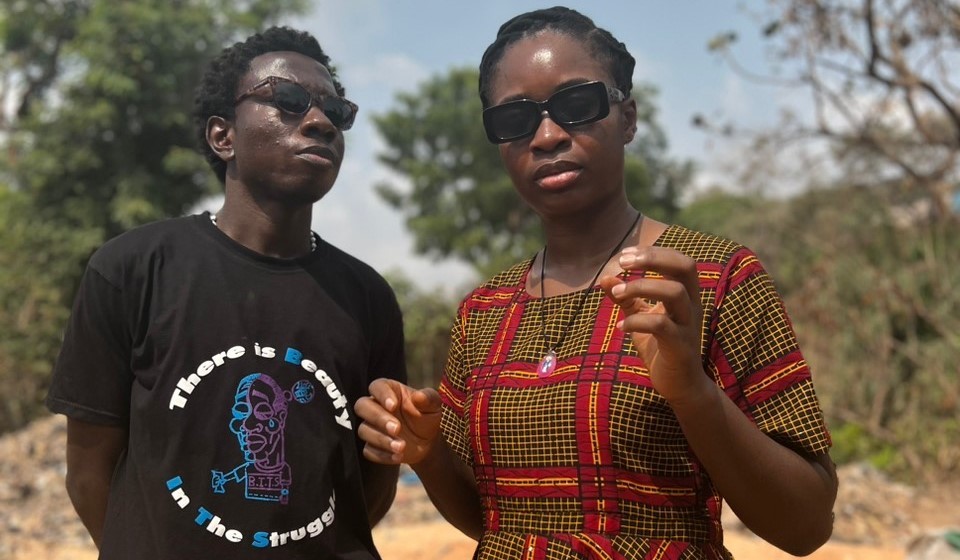
Innocent Ekejiuba: Dika, we are having this conversation within the context of a Protocinema film screening program which is about artworks that address planetary tyrannical conditions. The program is about considering these conditions and thinking beyond what is offered. It is also about mapping and making visible some of these situations and, in a sense, creating a connection across all the different places from which the works are from: Cambodia to India, through Palestine, Iraq, and Nigeria. Your film A Quiet Monday is in this program. Would you tell us about the conditions that necessitated your film?
Dika Ofoma: I live in Enugu, Nigeria, and on May 30th, 2021, we experienced the first sit-at-home order, by IPOB secessionist group, which was planned in commemoration of Biafra and the Nigerian Civil War (1967-1970). On that particular Friday, I had planned on going to a concert by the highlife band The Cavemen, but IPOB, a secessionist group in the southeastern part of the country, issued a decree prohibiting anyone from going out. This decree marked the beginning of the sit-at-home orders. Following the arrest of their leader, IPOB declared that the sit-at-home directive would apply to every Monday. So every Monday, no one should go to school, no one should do business, everyone should stay in their houses. And it felt like a joke. It felt like a stupid joke, like this could not happen, and then, the first Monday, nobody took the order seriously. But we heard news of schools, especially in rural areas, where students were flogged because they had gone out to school; shops were burned and looted because they had opened on a Monday. That gave people a sense that this was serious, and the government wasn't doing anything about it. We thought it would just be for a while, but it continued. And then, around Christmas, that sort of stopped. That's Christmas of 2021, and people started going out again. But then I remember the very first Monday in Enugu after New Year, I had gone out—there was a job I was supposed to interview for—and all of a sudden, there was chaos in town, and, allegedly, IPOB had gone all over town and shot their guns into the air to instill fear in people. And so the following Monday, everyone just stayed home, and it continued from then on till today. There's been some attempts by the government to instill some confidence in the citizens to come out on Mondays, slowly schools and banks are opening on Mondays now. But Enugu still feels like a ghost town on Mondays. Living through these experiences inspired this story.
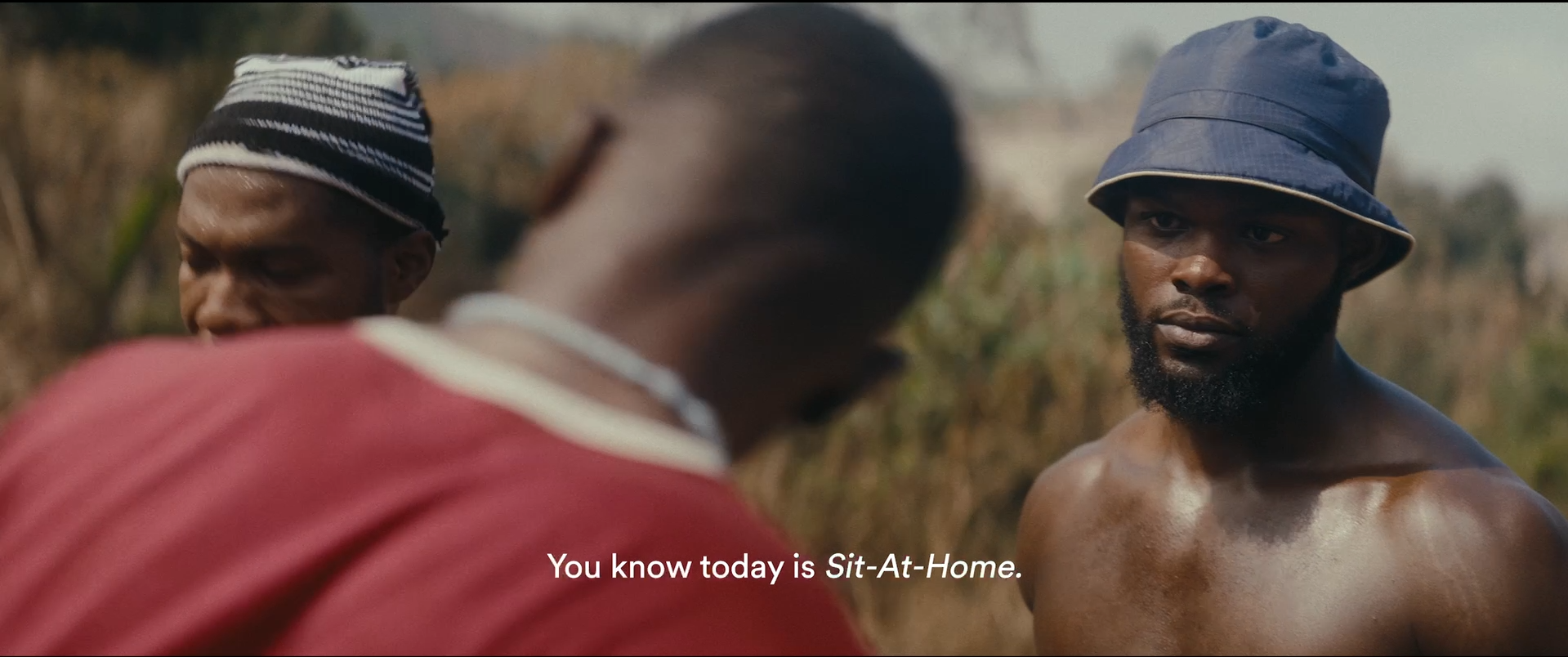
IE: There is an irony in the thought that the group IPOB has probably killed more Igbo people than they have anyone else, even though they claim to be fighting for the freedom of the Igbo state and the establishment of a Biafran state. Those who they claim to fight for are those whom they have harmed the most. I have tried to—sometimes successfully—speak with people who are sympathetic to the IPOB mission or people who are in the IPOB organization, and I know several writers and journalists have attempted, to varying degrees of success, to engage with them in conversations. I know how difficult this is. How did this tricky relationship affect making this film and its distribution?
DO: I faced a significant challenge in casting the role of Calistus. When I approached actors and explained the story to them, they would often decline. This reluctance stemmed from the fact that young men were often targeted by the group depicted in the film. While my intention wasn't primarily political, the film does contain some criticism of IPOB. However, my main focus was to depict the realities of the situation through the eyes of ordinary people, like Kamnonu and her brother Ogbonna. But I didn't foresee that I would have to go through three or four actors, who all said no to playing Calistus. The person who eventually played Calistus is my friend. The first time I went to him, he said no. After about four actors turned down the role, I returned to him. He's my friend, so I talked him into it. He is not a professional actor. He's a tech boy who I dragged into this film. Actors were also turning down Ogbonna’s role, it wasn’t just Calistus. I mean, Uzoamaka jumped up to play Kamnonu; she was happy with the character. But the male leads were difficult to cast. Also, just before we started shooting A Quiet Monday, a DPs we approached to work with apparently had gone on another shoot in the state of Imo. They were shooting on a Monday, and IPOB had come to attack them, so he had PTSD from that experience. When we approached him, he told us he wouldn't be interested in shooting in Enugu or anywhere else in the South East due to security concerns. This also instilled fear in us, so for a while, we were considering shooting in Lagos instead. This delayed shoot from November 2022 till January of 2023, when we eventually shot the film in Enugu. But it was a struggle to get people on board for the film.
IE: Do you think that it's possible to be political without being overly explicit about it?
DO: You're right, and what I meant to convey is that it's not overtly didactic or preachy. While A Quiet Monday does include political criticism, the primary aim was to emotionally engage the audience with the story of these siblings navigating their daily lives amidst the challenges posed by the decree. So, yes, in essence it is a political story, but the focus remains on connecting with the audience on the emotional level of what it is like to live within the fear and constraints of that group.
IE: Nigerians view film predominantly as a form of entertainment, which reflects Nollywood's influence and has resulted in the industry's financial success. Consequently, many Nigerian filmmakers tend to approach filmmaking in a binary manner: creating either purely entertaining films or hardcore documentaries focused on singular topics. You, however, approach storytelling slightly differently. Maybe because you watched a lot of telenovellas when you were growing up, there is an element of interwoven storytelling in your films. Do you intentionally use storytelling as a way to address critical sociopolitical conditions in an approachable manner?
DO: Some of my early introduction to storytelling was from reading African novels and while they entertained, they passed social commentary, sometimes the stories were set against a political backdrop, and these made the stories richer and more compelling. One of the African filmmakers I made a conscious effort to study when I took a serious interest in storytelling was Ousmane Sembène. His films were critical of the Senegalese government and her leaders and were even banned sometimes. The Senegalese government's resistance to these films underscores the power of storytelling in raising awareness among people. And this is the kind of awareness that comes when we reflect things back to people, sometimes things that we had hitherto overlooked. When we hear stories, they can often feel distant, like mere headlines amidst our daily challenges. Issues like sitting at home due to IPOB directives may seem like just another inconvenience. But what film does is remarkable—it bridges the gap between us and those experiences, fostering empathy. This ability to understand and share the feelings of others is a powerful force in driving activism. Many leading activists are not directly affected by the issues they champion. It's the empathy they feel for others that propels them forward. That's what film can do. Empathy.
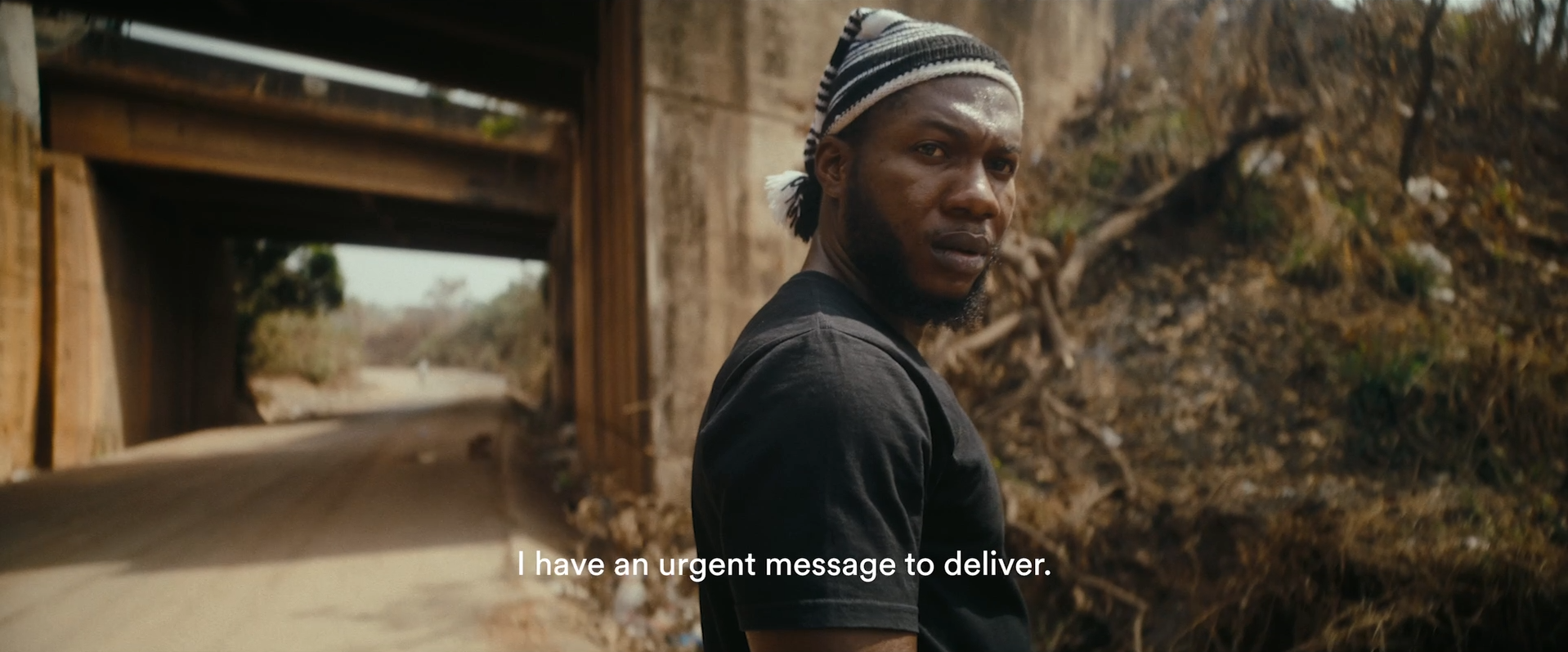
IE: Sometimes empathy is all about finding the right language, communicating your work, and ensuring that the message gets across. A key consideration in that conversation is language itself; how language is used to communicate empathy, and how it sometimes falls short of what is necessary. How did you arrive at the decision to have the language spoken in the film to be Igbo, which is then subtitled into English?
DO: Most of my decisions were about what felt true. The primary language in Enugu is Igbo. Most people who live in Enugu speak Igbo, so if we are making a film about people who live in Enugu, it automatically makes sense to make it in Igbo. But then, also, it is a film that I intend to show to Nigerians, and many Nigerians outside the SouthEast do not speak Igbo. So, what language would unify my audience? And so, I made the decision to subtitle the film in English.
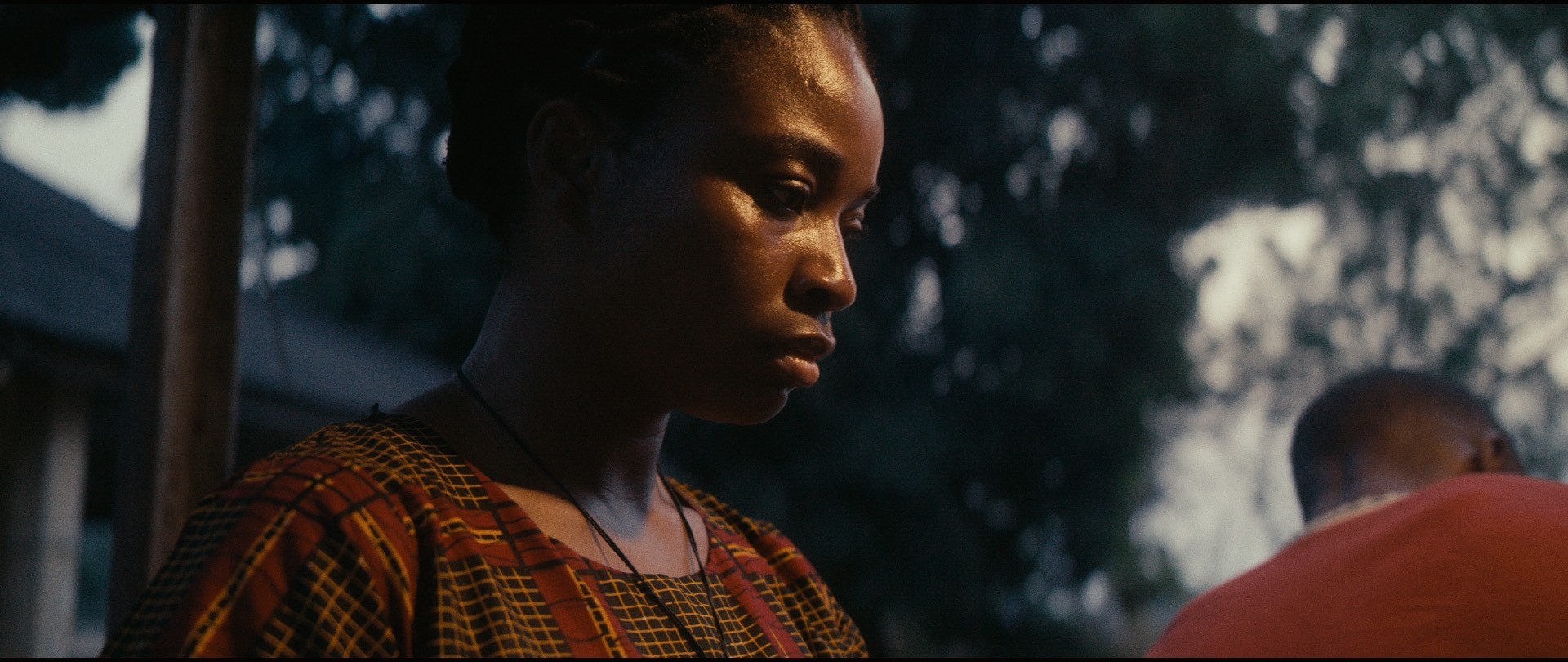
IE: Going back a bit to IPOB, what they claim to want is secession, but, in my opinion, what they really want is anarchy. Given the history of Biafra in Nigeria and the uneasy history of the Igbos in Nigeria—with all that happened pre and post the civil war—is secession really the answer, as IPOB claims?
DO: Growing up in Gombe, a town in northeastern Nigeria, I always saw myself as Nigerian and Igbo. Both identities were not in conflict. I grew up speaking Igbo, Hausa, and English, and I identified with Gombe when people asked where I was from. People often say to me, “But you are Igbo,” and then I have to say, “Oh, yeah. My parents are from Imo.” Still, I find contentment in my Nigerian identity. Yet, when it comes to the idea of secession and IPOB's vision of Biafra, it's like envisioning a utopia—a place where all the South East's problems vanish, akin to how Christians speak of heaven. However, I ponder the practicalities. What have IPOB leaders done for the Igbo people? Even if Biafra were to materialize, wouldn't it be the same Igbo elites governing, with little change? Renaming the South East to Biafra and adopting new symbols won't work magic. IPOB's tactics, like sit-at-home orders, aim to oppose the federal government but hit everyday Igbos hardest. When Buhari was in power, IPOB shutting down the South East did not faze him the same way it is not fazing Tinubu now. Ordinary folks who are unable to work or attend school suffer the most. So, I question the utopian IPOB promises. Personally, I don't believe in secession.
IE: Are there any questions from the audience?
Audience Member: What struck me about your film was the authenticity of the characters. Kamnonu remembering to pray just before eating felt genuine, reminiscent of my Catholic upbringing. Did you have to redo scenes often, or was it more about working with actors familiar with the language and culture? Was it primarily about casting the right actors, or did you face other challenges to achieve that realism?
DO: It started with writing. I knew what I was going for. I was going for a documentary-esque feel for the film, which also influenced how the camera worked. For the performances, I sent film references with naturalistic acting styles to the actors to study. We also held several rehearsals, particularly to ensure the accuracy of the Igbo language. It was essential to rehearse from the start to ensure clarity in dialogue delivery and timing. Despite the logistical challenge of having actors in different locations, we conducted Zoom meetings and dry runs on set. Ultimately, the authenticity stemmed from the dialogue I drew from real-life experiences, such as my upbringing in a Catholic Igbo family, and aimed to capture genuine sibling interactions on screen.
Audience Question to both speakers: When it comes to filmmaking, do you think intention is greater than impact? Do you believe the viewer response theory is more important than a pragmatic criticism?
DO: Do you mean my vision versus what the audience takes away from it?
IE: Roland Barthes famously wrote about the necessity of the author's death and the birth of the reader to achieve meaning-making. For me, impact and intention are equally as important because, without intention, there won’t be any vehicle for impact. For example, the appearance of the army to arrest everyone, the relationship between Ogbonna and Calistus, and how all these events affect Kamnonu in the film. This could have a lasting impact on individuals watching the film depending on who the audience member is.
IE [to DO]: Beyond the politics of Biafra, there is also the politics of relationships between siblings or romantic partners. Are they both important to you?
DO: As you say, they are both important. The audience is also not a monolith, so everyone will draw something different from the film. I'm happy that the work is impactful. Whether wittingly or unwittingly, some of the impact is a reflection of my intention.
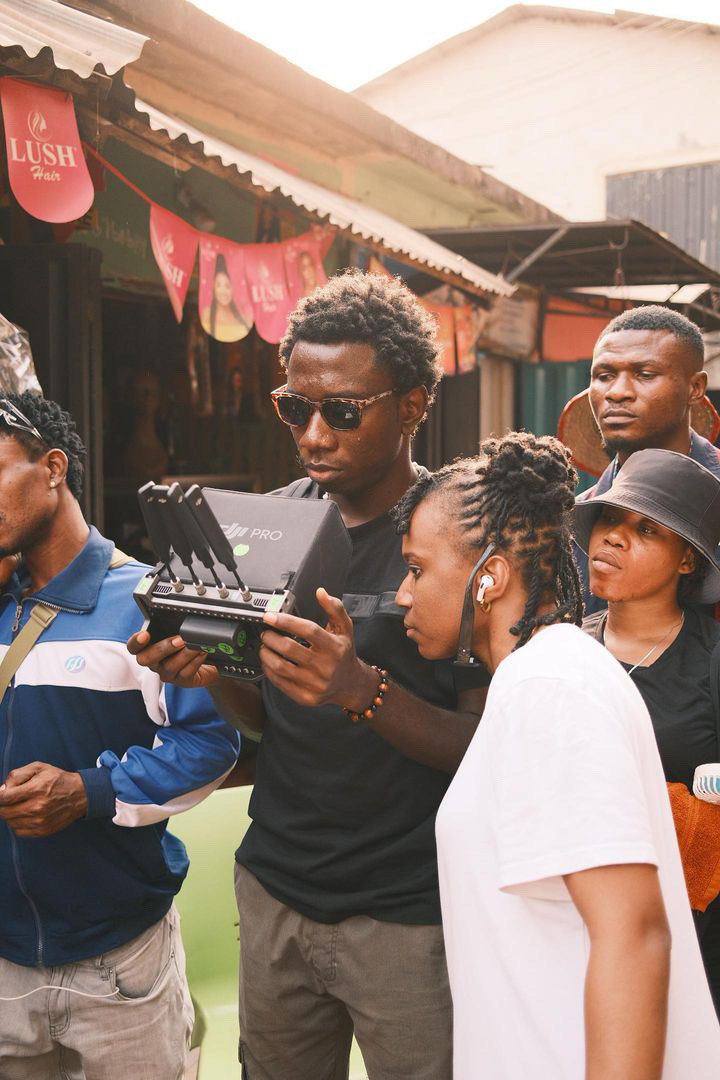
Audience Member: My question is about this screening’s video/ film curation. It seemed, initially, that the series of films addressed tyranny and were only looking to the global south and thank god for Michael Rakowitz’s film, where we finally got a glimpse of the role of the West or the global north in how tyranny comes to be sometimes, and who sometimes facilitates tyranny. So how much of that was conscious, or was that like a little Hail Mary?
IE: When Mari Spirito and Laura Raicovich curated this screening, they were very conscious and careful that these artworks transcend the limitations of oppression. In the research process they found that there were artists who were facing the monsters/oppressors/West and other artists who were facing the creation of new worlds. These were intentional decisions on the side of the artists and curators. The Ballad of Special Ops Cody isn’t the first work in the lineup that reflects on the role of the West in upholding tyranny. Rattanna Vandy's Monologue reflects on the bombing of Cambodia by the West and the impact it left on his family.
I do not believe in spending the time and energy with which we could uplift and critically engage our ideas and communities on Western entities that constantly seek to control our ideas and communities. I believe that the best opposition is to provide visibility for our communities and center our philosophies, ideas, and movements, rather than centering and providing more visibility for the oppressor.
This reminds me of Gabi Ngcobo, who was once asked if the choice to paint the walls of the Center for Historical Reenactment black was in direct response to the “white cube.” She replied that she was not thinking of the white cube when she chose to paint the walls black. The walls were painted black because that suited the project they were working on. The focus was not on finding a place to put the Western powers in the narrative. What was more important for us is the narratives being told by these artists and filmmakers, full stop.
Audience Member [Addressing DO]: If your main focus as a filmmaker is to tell the story of ordinary people, do you sometimes struggle when people hyperfocus on politics because everything is political?
DO: I will say no, and this is why the filmmaker makes the film that they want to make, and the audience is allowed to see the film that they want to see. And yes, this film is deliberately political. Of course, I did not make a film about the politics of Biafra and Nigeria and then come out to say that I was not making a political film. It was. However, my main focus was reflecting on the ways politics affects the lives of ordinary people.
A holistic conversation on Biafra can’t be encapsulated in a twenty-minute film. The story of Biafra goes as far back as the 60s, beginning in the 1966 pogroms that led to the death of thousands of Igbo people in Northern Nigeria. Those deaths have been unaccounted for. When the people, who were later known as Biafrans, decided to break away from the rest of Nigeria to safeguard themselves, the Nigerian government attacked, and a three-year war ensued, leading to the death of millions of Igbo people. What happens in A Quiet Monday is the trauma of those events, a depiction of the aftermath of that war. It shows that although the war has ended, these people have not yet recovered nor healed.
And while, yes, the federal government bears a large responsibility for the Monday curfews in the South East and how it handled the calls for secession from the group, this doesn’t absolve IPOB of the violence. Even in the film, Ogbonna says: “The same Nigeria that’s left us in this ungodly darkness.” Here, he points directly at the ineptitude of the Nigerian government that has allowed secessionist sentiments to fester.
* * *
ภาษาไทย
วันจันทร์อันเงียบงันและการกดขี่ที่สนั่นดัง
บทสนทนาระหว่างคนทำหนัง ดีคา โอโฟมา (Dika Ofoma) และคิวเรเตอร์ อินโนเซนต์ เอเคจียูบา (Innocent Ekejiuba) ว่าด้วยภาพยนตร์ของโอโฟมาเรื่อง ‘วันจันทร์อันเงียบงัน’ ซึ่งเผยโฉมหน้าแห่งการใช้ชีวิตในประเทศไนจีเรีย และสิ่งที่เกิดขึ้นเมื่อรัฐบาลสร้างหลุมอากาศที่ทำให้ความรุนแรงลุกลามไปเรื่อย
โดย ดีคา โอโฟมา (Dika Ofoma) และ อินโนเซนต์ เอเคจียูบา (Innocent Ekejiuba)

Dika Ofoma and Uzoamaka Aniunoh, Behind the scene Photo by Eddie Eduvie, Enugu, 2023
อินโนเซนต์ เอเคจียูบา / IE: ดิกา เรามาคุยกันครั้งนี้ภายใต้บริบทของโปรแกรมการฉายหนังของ Protocinema เกี่ยวข้องกับผลงานศิลปะที่กล่าวถึงสภาพการณ์การกดขี่ที่เกิดขึ้นบนโลก โปรแกรมนี้มีวัตถุประสงค์เพื่อพิจารณาสภาพการณ์เหล่านี้และคิดไปไกลกว่าสิ่งที่มันเสนอมาเอง และมันยังเกี่ยวข้องกับการวางผังและวาดภาพสถานการณ์บางอย่างเหล่านี้ และอีกทางหนึ่ง ก็สร้างความเชื่อมโยงข้ามสถานที่ต่าง ๆ ที่เป็นที่มาของผลงาน: จากกัมพูชาไปยังอินเดีย ผ่านปาเลสไตน์ อิรัก และไนจีเรีย ภาพยนตร์ของคุณเรื่อง ‘วันจันทร์อันเงียบงัน’ (A Quiet Monday) ก็อยู่ในโปรแกรมนี้ ช่วยเล่าให้เราฟังหน่อยได้ไหมว่าภายใต้สถานการณ์ใด จึงทำให้ภาพยนตร์เรื่องนี้เกิดขึ้นมา
ดีคา โอโฟมา / DO: ผมอาศัยอยู่ในเมืองเอนูกู ประเทศไนจีเรีย วันที่ 30 พฤษภาคม ปี 2021 เราได้เผชิญหน้ากับประสบการณ์การถูกสั่งให้กักตัวอยู่บ้าน (sit-at-home order) ครั้งแรกโดยกลุ่มแบ่งแยกดินแดน IPOB [1] ซึ่งคำสั่งนี้เกิดขึ้นมาเพื่อรำลึกถึงบิอาฟรา (Biafra รัฐที่ประกาศแบ่งแยกดินแดนจากไนจีเรียในช่วงปี 1967 - 1970 ซึ่งมีประชากรส่วนใหญ่เป็นชาวอีโบ) และสงครามกลางเมืองของไนจีเรีย (1967-1970) ย้อนกลับไปในวันศุกร์นั้น ผมวางแผนจะไปชมคอนเสิร์ตวงแนวไฮไลฟ์ที่ชื่อ The Cavemen แต่ IPOB กลุ่มผู้ก่อการแบ่งแยกดินแดนในภาคตะวันออกเฉียงใต้ของประเทศ ได้ออกคำสั่งห้ามออกจากบ้าน และคำสั่งนี้ก็เป็นจุดเริ่มต้นของคำสั่งให้อยู่บ้าน (sit-at-home order) ภายหลังจากผู้นำของพวกเขาถูกจับกุม กลุ่ม IPOB ประกาศว่าคำสั่งให้อยู่แต่ในบ้านจะถูกบังคับใช้ทุกวันจันทร์ ดังนั้นทุกวันจันทร์ จะไม่มีใครไปโรงเรียน ไม่มีใครออกไปทำธุรกิจ ทุกคนอยู่บ้าน และมันก็ให้ความรู้สึกเหมือนกับเรื่องตลก มันรู้สึกเหมือนเป็นเรื่องขำ ๆ ที่ไม่น่าจะเกิดขึ้น เมื่อวันจันทร์แรกมาถึง ไม่มีใครถือคำสั่งนั้นเป็นเรื่องจริงจัง แต่เราได้ยินข่าวจากโรงเรียน โดยเฉพาะในพื้นที่ชนบทที่เหล่านักเรียนถูกเฆี่ยนตีเพราะพวกเขาออกไปโรงเรียน ร้านค้าถูกเผาและปล้นเพราะพวกเขาเปิดร้านในวันจันทร์ สิ่งเหล่านี้ทำให้ผู้คนรู้สึกว่าเรื่องนี้เป็นเรื่องจริงจัง และรัฐบาลก็ไม่ได้ทำอะไรสักอย่าง เราคิดว่ามันเป็นแค่สถานกาณ์ชั่วคราว แต่มั��ก็ยังดำเนินต่อไปเรื่อย ๆ กระทั่งประมาณช่วงเทศกาลคริสต์มาส สถานการณ์นั้นก็เหมือนจะหยุดลง มันเป็นวันคริสต์มาสปี 2021 ผู้คนเริ่มออกไปข้างนอกอีกครั้ง แต่แล้วผมก็จำได้ว่าในวันจันทร์แรกหลังจากวันขึ้นปีใหม่ในเอนูกู ผมออกจากบ้านเพราะมีงานที่ผมจะไปสัมภาษณ์ แล้วอยู่ดี ๆ ก็เกิดความวุ่นวายในเมือง และเหมือนกับว่า IPOB ได้เข้าไปคุมพื้นที่ทั่วเมืองพร้อมกับยิงปืนขึ้นฟ้าเพื่อทำให้ผู้คนหวาดกลัว แล้วในวันจันทร์ถัดไป ทุกคนก็อยู่แต่ในบ้าน และมันก็ยังเป็นอย่างนั้นต่อไปจนถึงทุกวันนี้ รัฐบาลมีความพยายามบางอย่างในการสร้างความมั่นใจเพื่อชักชวนให้กับพลเมืองออกจากบ้านในวันจันทร์ ตอนนี้โรงเรียนและธนาคารทยอยกลับมาเปิดให้บริการในวันจันทร์แล้ว แต่เอนูกูยังคงให้ความรู้สึกเหมือนเมืองร้างในวันจันทร์ การใช้ชีวิตภายใต้ประสบการณ์พวกนี้ก็กลายเป็นแรงบันดาลใจให้เกิดเรื่องราวนี้

IE: มันดูตลกร้ายอยู่นะถ้าลองคิดว่ากลุ่ม IPOB น่าจะฆ่าชาวอีโบ (Igbo กลุ่มชาติพันธุ์ในไนจีเรีย) มากกว่าใครอีก แม้ว่าพวกเขาจะอ้างว่ากำลังสู้เพื่อเสรีภาพของรัฐอีโบและการสถาปนารัฐบีอาฟรา ผู้คนที่พวกเขาอ้างว่ากำลังต่อสู้ให้อยู่ กลับเป็นคนที่พวกเขาทำร้ายมากที่สุด ผมพยายามพูดคุยกับผู้ที่สนับสนุนปฏิบัติการของ IPOB หรือคนในองค์กร IPOB ซึ่งบางครั้งก็พยายามสำเร็จ และผมรู้ว่ามีนักเขียนและนักข่าวหลายคนพยายามจะสร้างบทสนทนากับพวกเขาด้วย แต่ก็ประสบความสำเร็จมากน้อยแตกต่างกัน ผมรู้ว่ามันยากขนาดไหน ความสัมพันธ์ที่ซับซ้อนนี้ส่งผลต่อการสร้างภาพยนตร์และการเผยแพร่มันอย่างไรบ้าง
DO: ผมต้องเจอกับความท้าทายอย่างมากในการแคสต์บท คาลิสตัส (Calistus) พอผมไปทาบทามนักแสดงและอธิบายเนื้อเรื่องให้พวกเขาฟัง พวกก็เขามักจะปฏิเสธ ความรู้สึกต่อต้านนี้เกิดจากข้อเท็จจริงที่ว่าเหล่าเด็กหนุ่มมักจะถูกเล็งเป้าโดยกลุ่มคนที่��นังพูดถึง แม้ว่าเจตนาของผมจะไม่ได้เป็นเรื่องการเมืองโดยตรง แต่ภาพยนตร์ก็มีการวิพากษ์วิจารณ์ IPOB บ้าง อย่างไรก็ตาม จุดสนใจหลักของผมคือการนำเสนอความเป็นจริงของสถานการณ์ผ่านสายตาของคนธรรมดา ๆ อย่าง คามโนนู (Kamnonu) และน้องชายของเธอ อ็อกบอนนา (Ogbonna) แต่ผมไม่คาดคิดว่าจะต้องเจอนักแสดงถึงสามหรือสี่คนที่ปฏิเสธบทบาทคาลิสตัสทั้งหมด สุดท้ายคนที่รับบทเป็นคาลิสตัสก็คือเพื่อนของผม ครั้งแรกที่ผมไปหาเขา เขาก็ปฏิเสธ แต่หลังจากที่นักแสดงประมาณสี่คนไม่ยอมเล่นบทนี้ ผมก็กลับไปหาเขาอีกครั้ง เขาเป็นเพื่อนของผม ผมเลยพยายามคุยกับเขา เขาไม่ใช่นักแสดงมืออาชีพ เขาเป็นเด็กสายเทคฯ ที่ผมดึงมาเล่นหนังเรื่องนี้ พวกนักแสดงก็ไม่ยอมเล่นบทอ็อกบอนนาเหมือนกัน ไม่ใช่แค่บทคาลิสตัส คือว่า อูโซมาคา (Uzoamaka) ก็ตื่นเต้นที่จะรับบทเป็นคามโนนู เธอชอบตัวละครนั้น แต่บทตัวละครนำชายนั้นแคสต์ยากมาก นอกจากนี้ แค่ก่อนที่เราจะเริ่มถ่ายทำ A Quiet Monday พวกผู้กำกับภาพที่เราชวนมาร่วมงานด้วยก็เพิ่งไปถ่ายอีกงานกันที่รัฐอื่นของอิโมะ พวกเขาถ่ายงานกันในวันจันทร์ และ IPOB ก็ไปโจมตีพวกเขา ดังนั้นเขาเลยมีอาการสะเทือนขวัญจากประสบการณ์นั้น เมื่อเราติดต่อเขาไป เขาก็บอกว่าเขาไม่สนใจที่จะถ่ายทำในเอนูกูหรือที่ใดก็ตามในภาคตะวันออกเฉียงใต้ เนื่องจากข้อกังวลด้านความปลอดภัย เรื่องนี้ก็ทำให้พวกเราหวาดกลัวด้วยเช่นกัน ดังนั้นในช่วงเวลาหนึ่ง เราจึงคิดถึงการไปถ่ายทำที่ลากอสแทน ทำให้การถ่ายทำล่าช้าออกไปจากเดือนพฤศจิกายน 2022 จนถึงเดือนมกราคม 2023 ซึ่งในที่สุดเราก็ได้ถ่ายทำที่เอนูกู แต่มันก็ต้องฝ่าฟันใช้ได้เลยเพื่อหาคนมาร่วมทีมสำหรับภาพยนตร์เรื่องนี้
IE: คุณคิดว่าเป็นไปได้หรือไม่ที่จะสร้างงานการเมืองโดยไม่ต้องตรงไปตรงมาจนเกินไป
DO: คุณพูดถูกแล้ว และผมต้องการการถ่ายทอดมันไม่ใช่การเทศนาสั่งสอนตรง ๆ แม้ว่า A Quiet Monday จะมีการวิพากษ์วิจารณ์ทางการเมืองบ้าง แต่จุดมุ่งหมายหลักคือการพาผู้ชมเข้ามามีส่วนร่วมในแง่อารมณ์ความรู้สึกกับเรื่องราวของพี่น้องพวกนี้ที่ต้องใช้ชีวิตแต่ละวันด้วยความท้าทายจากคำสั่งนั้น ดังนั้น ใช่เลยว่าโดยแก่นแท้แล้วมันเป็นเรื่องราวทางการเมือง แต่จุดสำคัญของมันคือการสร้างความเชื่อมโยงกับผู้ชมในแง่อารมณ์ความรู้สึกของการใช้ชีวิตอยู่ภายใต้ความกลัวและการควบคุมของคนกลุ่มนั้น
IE: คนไนจีเรียมองภาพยนตร์เป็นสื่อบันเทิงรูปแบบหนึ่งเป็นหลัก ซึ่งก็สะท้อนอิทธิพลของนอลลีวูด (Nollywood) และนำไปสู่ความสำเร็จทางรายได้ของอุตสาหกรรมนี้ [2] ด้วยเหตุนี้ คนทำหนังไนจีเรียจำนวนมากจึงมีแนวทางในการสร้างภาพยนตร์อยู่สองแนวทาง คือถ้าไม่สร้างภาพยนตร์เพื่อความบันเทิงอย่างเดียว ก็ทำสารคดีจริงจังเจาะลึกประเด็นใดประเด็นหนึ่ง แต่คุณกลับมีวิธีการเล่าเรื่องที่แตกต่างออกไปอยู่ บางทีอาจเป็นเพราะคุณดูละครน้ำเน่ามากในวัยเด็ก เลยได้องค์ประกอบของการเล่าเรื่องต่าง ๆ มาถักทออยู่ในหนังของคุณ คุณตั้งใจใช้กลวิธีการเล่าเรื่องเป็นหนทางที่จะนำเสนอสถานการณ์ทางสังคมการเมืองที่แหลมคมให้มันง่ายแก่การเข้าถึงหรือไม่
DO: ผมได้รู้จักกับศาสตร์แห่งการเล่าเรื่องแรก ๆ ก็มาจากประสบการณ์การอ่านนิยายแอฟริกัน ซึ่งแม้ว่าพวกมันจะทำหน้าที่ให้ความบันเทิง แต่ก็มีการวิพากษ์วิจารณ์สังคมไปด้วย บางเรื่องก็มีพื้นหลังทางการเมือง ซึ่งยิ่งทำให้เรื่องราวนั้นน่าสนใจและน่าติดตามมากขึ้นไปอีก หนึ่งในคนทำหนังแอฟริกันที่ผมได้ศึกษาอย่างจริงจังเมื่อผมหันมาสนใจการเล่าเรื่องคือ อุสมาน ซ็องบ็อง (Ousmane Sembène) หนังของเขาวิพากษ์วิจารณ์รัฐบาลและผู้นำของเซเนกัล จนถึงขั้นโดนแบนในบางที่ การปิดกั้นของรัฐบาลเซเนกัลต่อภาพยนตร์เหล่านี้ตอกย้ำให้เห็นพลังของการเล่าเรื่อง ในการสร้างความตระหนักรู้ในหมู่ประชาชน และนี่คือความตระหนักรู้ประเภทที่จะเกิดเมื่อเราสะท้อนสิ่งต่าง ๆ กลับไปสู่ผู้คน บางครั้งก็เป็นสิ่งที่เรามองข้ามมาก่อน เมื่อเราได้ยินเรื่องราว พวเขามักจะรู้สึกถึงระยะห่างกับมัน เหมือนกับข่าวหน้าหนึ่งที่เกิดขึ้นอยู่กลางวันยุ่ง ๆ ยาก ๆ ของเรา ประเด็นอย่างการอยู่บ้านตามคำสั่งของ IPOB อาจดูเหมือนแค่เรื่องยุ่งยากเรื่องหนึ่ง แต่สิ่งที่หนังทำได้นั้นน่าประทับใจมาก มันคือสะพานเชื่อมข้ามช่องว่างระหว่างเราและประสบการณ์เหล่านั้น และฟูมฟักความเห็นอกเห็นใจ ความสามารถในการเข้าใจและแบ่งปันความรู้สึกของผู้อื่นเป็นแรงที่ทรงพลังอย่างยิ่งในการทำกิจกรรมเคลื่อนไหว หัวหอกนักกิจกรรมจำนวนมากก็ไม่ได้โดนผลกระทบโดยตรงจากปัญหาที่พวกเขาเรียกร้อง แต่ว่านั่นแหละ สิ่งที่หนังทำได้ “ความเห็นอกเห็นใจ”

IE: บางครั้งความเห็นอกเห็นใจก็คือเพียงแค่การหาภาษาที่เหมาะสม ในการสื่อสารผลงานของคุณ และการทำให้แน่ใจว่าสารสำคัญนั้นได้รับการถ่ายทอดไปถึงผู้อื่น สิ่งสำคัญหนึ่งที่ต้องพิจารณาอย่างยิ่งในการสนทนานี้คือตัวภาษา ว่ามันจะถูกนำไปใช้อย่างไรในการสื่อสารความเห็นอกเห็นใจ และบางครั้งมันก็พลัดออกจากพวกสิ่งที่จำเป็นจริง ๆ คุณตัดสินใจอย่างไรที่จะให้ภาษาที่พูดในภาพยนตร์เป็นภาษาอีโบ แล้วจากนั้นจึงใส่คำบรรยายเป็นภาษาอังกฤษ
DO: ส่วนใหญ่แล้ว การตัดสินใจของผมมักมาจากความรู้สึกว่ามันใช่ ภาษาหลักที่ใช้ในเอนูกูคือภาษาอีโบ คนส่วนใหญ่ที่อาศัยอยู่ในเอนูกูพูดภาษาอีโบ ดังนั้นหากเราจะสร้างภาพยนตร์เกี่ยวกับคนที่อาศัยอยู่ในเอนูกู มันก็มีสมเหตุสมผลอยู่แล้วที่จะทำเป็นภาษาอีโบ แต่ก็อีกนั่นแหละ นี่คือภาพยนตร์ที่ผมตั้งใจจะฉายให้คนไนจีเรียดู และคนไนจีเรียจำนวนมากนอกพื้นที่ตะวันออกเฉียงใต้ไม่ได้พูดภาษาอีโบ ดังนั้นภาษาใดจะครอบคลุมผู้ชมทั้งหมดไว้ได้ล่ะ? ผมเลยตัดสินใจใส่คำบรรยายภาษาอังกฤษในภาพยนตร์เรื่องนี้

IE: ย้อนกลับไปที่เรื่อง IPOB สิ่งที่พวกเขาอ้างว่าต้องการคือการแยกดินแดน แต่ตามความเห็นของผม สิ่งที่พวกเขาต้องการจริงๆ คืออนาธิปไตย เพราะจากประวัติศาสตร์บีอาฟราในไนจีเรียและประวัติศาสตร์ที่ไม่ซับซ้อนของชาวอีโบในไนจีเรีย ที่ซึ่งทั้งหมดเกิดขึ้นก่อนและหลังสงครามกลางเมือง การแบ่งแยกดินแดนคือสิ่งที่ IPOB ต้องการจริง ๆ หรือ?
DO: การเติบโตในกอมเบ เมืองทางตอนเหนือของไนจีเรีย [3] ทำให้ผมมักจะมองตัวเองว่าเป็นคนไนจีเรียและชาวอีโบไปพร้อม ๆ กัน ทั้งสองอัตลักษณ์นี้ไม่ได้ขัดแย้งกัน ผมเติบโตมาโดยพูดทั้งภาษาอีโบ ภาษาเฮาซา (Hausa) และภาษาอังกฤษ ผมนิยามตนเองเป็นคนกอมเบเมื่อมีคนถามว่าผมมาจากไหน คนมักจะพูดกับผมว่า "แต่คุณเป็นคนอีโบนะ" แล้วผมก็ต้องตอบว่า "ใช่ แต่พ่อแม่ผมมาจากรัฐอิโมะ" อย่างไรก็ตาม ผมก็รู้สึกพอใจในเอกลักษณ์ไนจีเรียของตัวเอง แต่เมื่อพูดถึงแนวคิดการแยกดินแดนและจุดยืนของ IPOB ต่อบีอาฟรา มันเหมือนกับภาพฝันของดินแดนในอุดมคติ สถานที่ที่ปัญหาทั้งหมดในภาคตะวันออกเฉียงใต้หายไป เหมือนกับสวงสวรรค์ที่พวกคริสเตียนพูดถึง อย่างไรก็ตาม ผมยังสงสัยถึงความเป็นไปได้จริงของมัน กลุ่ม IPOB ได้ทำอะไรเพื่อประชาชนชาวอีโบบ้าง? ต่อให้บีอาฟราเกิดขึ้นได้จริง พวกชนชั้นนำอีโบเดิม ๆ ก็ยังปกครองอยู่ดีไม่ใช่เหรอ? พวกเขาอาจจะแค่เปลี่ยนแปลงอะไรนิดหน่อย เปลี่ยนชื่อภาคตะวันออกเฉียงใต้เป็นบีอาฟราและสร้างสัญลักษณ์ใหม่ขึ้นมา แต่มันไม่ได้เป็นเวทมนตร์วิเศษ กลยุทธ์ของ IPOB อย่างคำสั่งให้อยู่บ้านนั้นเป็นการมุ่งต่อต้านรัฐบาลกลาง แต่กลับส่งผลกระทบหนักหนาที่สุดต่อชาวอีโบธรรมดา ๆ ที่ใช้ชีวิตทั่วไป ช่วงที่บูฮารี (Buhari อดีตประธานาธิบดีไนจีเรีย) ดำรงตำแหน่ง การ “ชัตดาวน์” พื้นที่ตะวันออกเฉียงใต้ของพวก IPOB ก็ไม่ได้ก่อกวนเขาเท่ากับที่มันกวนใจทินนูบู (Tinubu ประธานาธิบดีไนจีเรียปัจจุบัน) [4] ผู้คนทั่วไปที่ไม่สามารถทำงานหรือไปโรงเรียนต่างหากที่ได้รับผลกระทบที่สุด ดังนั้น ผมเลยตั้งคำถามกับคำมั่นสัญญาของ IPOB แต่ส่วนตัวแล้ว ผมไม่เชื่อในการแบ่งแยกดินแดน
IE: มีคำถามจากทางผู้ชมบ้างไหม
ผู้ชม: สิ่งที่ติดใจผมมาจากภาพยนตร์เรื่องนี้คือความสมจริงของตัวละครต่าง ๆ การที่คามโมนูระลึกถึงการสวดมนต์ก่อนรับประทานอาหารนั้นให้ความรู้สึกจริงแท้มาก ทำให้ผมนึกถึงการเลี้ยงดูแบบคาทอลิกที่เจอมาในวัยเด็ก คุณต้องถ่ายทำฉากเหล่านั้นใหม่บ่อยหรือไม่? หรือมันมาจากการทำงานร่วมกับนักแสดงที่คุ้นเคยกับภาษาและวัฒนธรรมท้องถิ่นมากกว่า การคัดเลือกนักแสดงที่เหมาะสมเป็นสิ่งสำคัญที่สุดไหม หรือคุณเจออุปสรรคอื่น ๆ ในการสร้างความสมจริงให้กับภาพยนตร์เรื่องนี้?
DO: มันเริ่มต้นจากตอนเขียนบทก่อน ผมรู้ว่าผมต้องการทำอะไร ผมต้องการให้ภาพยนตร์มีบรรยากาศคล้ายสารคดี ซึ่งส่งผลต่อวิธีการทำงานภาพของกล้องด้วย สำหรับการแสดง ผมได้ส่งตัวอย่างภาพยนตร์ที่มีการแสดงแบบธรรมชาติให้นักแสดงได้ศึกษา เราก็ได้ซ้อมหลายครั้ง โดยเฉพาะเพื่อให้แน่ใจว่าภาษาอีโบที่ใช้ถูกต้องแม่นยำ มันสำคัญที่จะต้องซ้อมตั้งแต่เนิ่น ๆ เพื่อให้มั่นใจในความชัดเจนของการถ่ายทอดและจังหวะของบทสนทนา แม้ว่าจะมีความท้าทายจากการที่นักแสดงอยู่คนละสถานที่กัน แต่เราก็ใช้วิธีมาเจอกันใน Zoom แล้วก็ซ้อมแบบ dry run (ซ้อมแบบเสมือนจริง) ในเซ็ต ที่สุดแล้ว ความสมจริงนั้นมาจากบทสนทนาที่ผมดึงมาจากประสบการณ์ชีวิตจริง เช่น ประสบการณ์การเติบโตในครอบครัวอีโบคาทอลิก และความตั้งใจที่จะจับภาพปฏิสัมพันธ์ระหว่างพี่น้องให้ขึ้นไปอยู่บนจอ

ผู้ชม (ถามผู้พูดทั้งสอง): ในแง่การทำหนัง พวกคุณคิดว่าเจตนาที่ตั้งใจสำคัญกว่าผลกระทบไหม? คุณเชื่อไหมว่า ‘ทฤษฎีการตอบสนองของผู้ชม’ สำคัญกว่าคำวิจารณ์ในทางปฏิบัติ?
DO: คุณหมายถึงทรรศนะของผมกับสิ่งที่ผู้ชมได้จากมันเหรอ?
IE: โรลองด์ บาร์ตส์ ได้เขียนงานที่ได้รับความนิยมอย่างมากไว้ เกี่ยวกับความจำเป็นที่ผู้เขียนต้องตายไป และการเกิดใหม่ของผู้อ่านเพื่อให้กระบวนการสร้างความหมายได้เกิดขึ้น สำหรับผม ผลกระทบและเจตนาสำคัญเท่า ๆ กัน เพราะหากไร้ซึ่งเจตนา ก็จะไม่มีสิ่งใดนำพาไปสู่ผลกระทบ ยกตัวอย่างเช่น การปรากฏของกองทหารที่จับกุมทุกคน ความสัมพันธ์ระหว่างอ็อกบอนนาและคาลิสตัส และวิธีที่เหตุการณ์เหล่านี้ส่งผลกระทบต่อ คามโนนูในภาพยนตร์ สิ่งเหล่านี้อาจส่งผลกระทบระยะยาวต่อผู้ชมภาพยนตร์ได้ ขึ้นอยู่กับว่าผู้ชมคนนั้นเป็นใคร
IE [ถาม DO]: นอกเหนือจากการเมืองเรื่องไบอาฟรา ยังมีการเมืองในความสัมพันธ์ระหว่างพี่น้องหรือคู่รักด้วย สิ่งเหล่านี้สำคัญสำหรับคุณเช่นกันใช่หรือไม่?
DO: ถูกต้องเลย สิ่งเหล่านั้นสำคัญทั้งคู่ ผู้ชมก็ไม่ใช่กลุ่มคนที่เหมือนกันหมด ดังนั้นทุกคนจึงเก็บเอาอะไรต่างกันออกไปจากภาพยนตร์เรื่องนี้ ผมดีใจที่ผลงานนี้สร้างแรงสั่นสะเทือนได้ และไม่ว่าจะตั้งใจหรือไม่ตั้งใจ ผลตอบรับบางส่วนก็เป็นการสะท้อนเจตนาของผม

Dika Ofoma and Blessing Uzzi (Producer, A Quiet Monday), Behind the scene Photo by Eddie Eduvie, 2023
ผู้ชม: คำถามของผมเกี่ยวกับการคิวเรต (คัดเลือก) วิดีโอ/ภาพยนตร์ในการฉายในครั้งนี้ ตอนแรกมันเหมือนกับว่าว่าภาพยนตร์เหล่านี้จะกล่าวถึงการปกครองแบบทรราช และมุ่งเน้นไปที่กลุ่มประเทศโลกใต้ (global south) เท่านั้น และด้วยภาพยนตร์ของไมเคิล รากูวิทซ์ (Michael Rakowitz) ในที่สุดเราก็ได้เห็นบทบาทของชาติตะวันตกหรือประเทศโลกเหนือ (global north) ที่บางทีก็เป็นต้นกำเนิดของการปกครองแบบเผด็จการ เรื่องพวกนี้เป็นความตั้งใจอยู่แล้วหรือแค่เรื่องบังเอิญเท่านั้น
IE: เมื่อมารี สปิริโต (Mari Spirito)และ ลอรา ไรโคควิช (Laura Raicovich) คัดเลือกภาพยนตร์สำหรับงานฉายครั้งนี้ พวกเธอตั้งใจและระมัดระวังอย่างมากที่จะให้ผลงานศิลปะเหล่านี้ข้ามพ้นขีดจำกัดของการกดขี่ ในขั้นตอนการค้นคว้า พวกเธอพบว่ามีศิลปินบางคนที่เผชิญหน้ากับปีศาจ/ผู้กดขี่/ชาวตะวันตก และมีศิลปินบางคนที่เผชิญหน้ากับการสร้างโลกใหม่ การตัดสินใจเหล่านี้เป็นไปอย่างตั้งใจจากฝั่งศิลปินและคนคัดเลือกผลงาน ภาพยนตร์เรื่อง The Ballad of Special Ops Cody ไม่ใช่ผลงานชิ้นแรกในโปรแกรมที่สะท้อนบทบาทของตะวันตกในการสนับสนุนการปกครองแบบเผด็จการ ภาพยนตร์เรื่อง Monologue ของรัตตันนา วานดี (Rattanna Vandy) ก็สะท้อนเรื่องการทิ้งระเบิดในกัมพูชาโดยชาวตะวันตก และผลกระทบที่มันทิ้งไว้กับครอบครัวของเขา
ผมไม่เชื่อในการใช้เวลาและพลังงาน — ที่เราสามารถใช้ยกระดับและมีส่วนร่วมอย่างสร้างสรรค์ไปกับแนวคิดและชุมชนของเรา — ไปกับกลุ่มชาติตะวันตกที่พยายามควบคุมแนวคิดและชุมชนของเราอยู่เสมอ ผมเชื่อว่าการต่อต้านที่ดีที่สุดคือการเปิดพื้นที่ให้กับชุมชนและจัดวางแนวคิดปรัชญา แนวคิด และการเคลื่อนไหวของเราไว้ตรงศูนย์กลาง แทนที่จะให้ความสำคัญและเปิดพื้นที่มากขึ้นกับผู้กดขี่
นั่นทำให้ผมนึกถึง กาบี เอ็งโคโบ (Gabi Ngcobo) เธอเคยถูกถามว่าการตัดสินใจทาผนังของศูนย์จัดแสดงเรื่องราวประวัติศาสตร์ (Center for Historical Reenactment) ให้เป็นสีดำนั้น เป็นการตอบโต้ต่อการทำห้องนิทรรศการแบบ ‘กล่องขาว’ (white cube) โดยตรงหรือไม่ เธอตอบว่าเธอไม่ได้คิดถึงเรื่องกล่องขาวอะไรเลยตอนที่เลือกสีดำ ที่มันทาสีดำก็เพราะความเหมาะสมกับโครงการที่พวกเธอกำลังทำอยู่เท่านั้น พวกเธอไม่ได้สนใจอยู่กับการหาพื้นที่ให้กับชาวตะวันตกในโครงเรื่อง สิ่งที่สำคัญกว่าสำหรับเราคือเรื่องราวที่ศิลปินและผู้สร้างภาพยนตร์เหล่านี้เล่า แค่นั้น

ผู้ชม (ถาม DO): ถ้าจุดสนใจหลักของคุณในฐานะคนทำหนังคือการบอกเล่าเรื่องราวของคนธรรมดา มีบ้างไหมที่คุณรู้สึกลำบากเวลาผู้คนให้ความสนใจแต่กับเรื่องการเมือง เพราะว่าอะไร ๆ ก็เป็นการเมือง?
DO: คำตอบของผมคือไม่นะ และนี่ล่ะเหตุผลว่าทำไมคนทำหนังถึงสร้างหนังตามที่ตนต้องการ และผู้ชมก็มีสิทธิ์ที่จะดูหนังตามที่พวกเขาต้องการด้วย และแน่นอน ภาพยนตร์เรื่องนี้ตั้งใจจะมีความเป็นการเมือง มันก็แน่อยู่แล้ว ผมคงไม่ได้สร้างภาพยนตร์เกี่ยวกับการเมืองของไบอาฟราและไนจีเรีย แล้วออกมาพูดว่าผมไม่ได้ทำภาพยนตร์ทางการเมือง มันเป็นภาพยนตร์การเมือง แต่อย่างไรก็ตาม จุดสนใจหลักของผมคือการสะท้อนว่าการเมืองส่งผลกระทบต่อชีวิตของคนธรรมดา ๆ อย่างไร
เราไม่สามารถบรรจุบทสนทนาทั้งหมดเกี่ยวกับไบอาฟราเอาไว้ในภาพยนตร์สั้น 20 นาทีได้ เรื่องราวของไบอาฟราย้อนไปถึงช่วง 1960s เริ่มต้นจากการสังหารหมู่ในปี 1966 ที่นำไปสู่ความตายของชาวอีโบกว่าพันคนที่ตอนเหนือของไนจีเรีย ความตายเหล่านี้ยังไม่ได้มีการรับผิดชอบใด ๆ เลย เมื่อผู้คน ที่ภายหลังรู้จักกันในนามชาวไบอาฟรา (Biafran) ได้ตัดสินใจแยกตัวออกจากไนจีเรียเพื่อปกป้องตัวเอง รัฐบาลไนจีเรียก็ไปโจมตี นำไปสู่สงครามที่ยาวนานสามปี และคร่าชีวิตชาวอีโบไปอีกนับล้านคน สิ่งที่เกิดขึ้นใน A Quiet Monday คือปมบาดแผลจากเหตุการณ์เหล่านั้น ภาพสะท้อนหลังสงคราม ที่แสดงให้เห็นว่าแม้สงครามจะสิ้นสุดลงแล้ว แต่คนเหล่านี้ยังไม่ฟื้นดีและยังไม่ได้รับการรักษาแผลแต่อย่างใด
และก็ใช่ ที่รัฐบาลกลางแบกความรับผิดชอบมหาศาลต่อคำสั่งห้ามออกนอกบ้านในวันจันทร์ในพื้นที่บริเวณตะวันออกเฉียงใต้ และผลของมันในการจัดการกับการเรียกร้องแยกดินแดนจากกลุ่มนี้ แต่นั่นก็ไม่ได้ปลดเปลื้อง IPOB ออกจากความรุนแรงที่เกิด แม้แต่ในภาพยนตร์เอง อ็อกบอนนาก็พูดว่า "ไนจีเรียเดียวกันนี้ที่ปล่อยให้เราต้องมาอยู่ในความมืดมนสิ้นหวัง" ตรงนี้เองที่ไปชี้เข้าที่ความไร้ประสิทธิภาพของรัฐบาลไนจีเรีย ในการปล่อยให้แนวคิดแบ่งแยกดินแดนลุกลามขยายไปมากขึ้นอีก
IPOB (Indigenous People of Biafra) is a secessionist and separatist group founded in 2014 by Nnamdi Kanu. See “Biafran leader Nnamdi Kanu: The man behind Nigeria's separatists,” BBC News, May 5, 2017, https://www.bbc.com/news/world....
See “Nigeria - Media and Entertainment,” International Trade Administration | Trade.Gov, June 6, 2023, www.trade.gov/country-commercial-guides/nigeria-media-and-entertainment.
For some background on geographical conflict in Nigeria, see Frances Jumoke Oloidi and Leonard Ilechukwu, “Ethnicity in Nigeria in Post Colonial Era and Implications for Reader-Centred Library Collections,” Library Philosophy and Practice (2021), https://digitalcommons.unl.edu/cgi/viewcontent.cgi?article=13384&context=libphilprac
R. O. Okonkwo, “The trouble with IPOB’s sit-at-home orders,” Premium Times, January 23, 2022, https://www.premiumtimesng.com/opinion/507361-the-trouble-with-ipobs-sit-at-home-orders-by-rudolf-ogoo-okonkwo.html.
